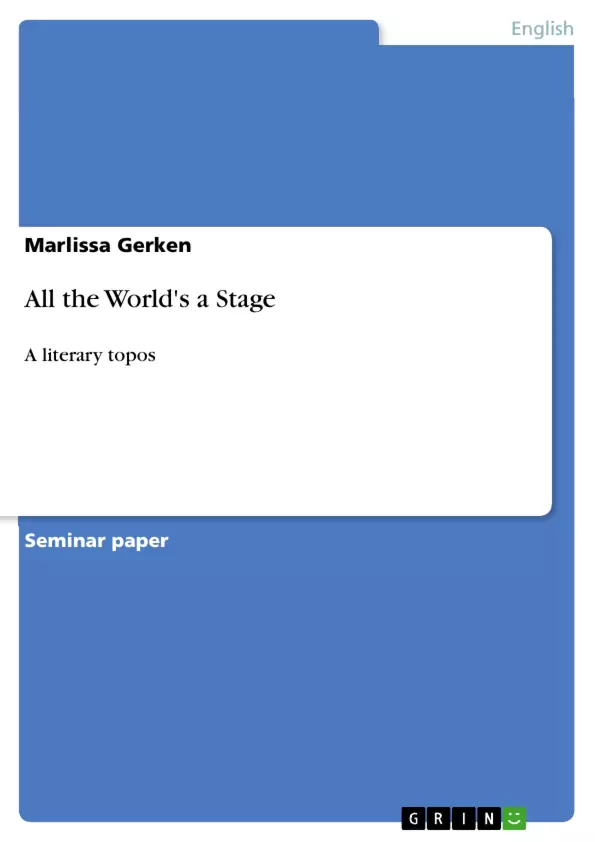“All the world’s a stage” is a phrase we usually associate with Shakespeare and his plays. Did Shakespeare coin this phrase, was it used by his contemporaries or do its origins in fact go back further? In how far was this concept of ‘the world being a stage’ taken up in post-Shakespearean times?
This paper is an attempt to find out the actual origins of this phrase and point out how it was used throughout the centuries.
Table of Contents
- 1. Introduction
- 2. All the World's a Stage
- 3. Conclusion
Objectives and Key Themes
This paper aims to trace the origins of the phrase "all the world's a stage" and examine its usage throughout history. It explores the evolution of this literary topos across different periods and literary traditions.
- The origins and evolution of the "world as a stage" metaphor.
- Shakespeare's use of the metaphor in his plays.
- The presence of the metaphor in pre-Shakespearean and post-Shakespearean literature.
- The influence of the metaphor on Baroque theatre.
- The continued relevance of the metaphor in modern literature.
Chapter Summaries
1. Introduction: This introductory chapter sets the stage for the paper by posing the central question: What are the origins of the phrase "all the world's a stage," and how has this concept been utilized throughout literary history? It outlines the paper's objective to investigate the phrase's historical development and its application across various literary periods.
2. All the World's a Stage: This chapter delves into the core theme of the paper, exploring the prevalence and evolution of the "world as a stage" metaphor in literature. It begins by examining Shakespeare's utilization of this metaphor, highlighting its presence in plays like *As You Like It* and *Macbeth*, showcasing how it underscores the transient and performative aspects of life. The chapter then expands the scope beyond Shakespeare, citing examples from pre-Shakespearean works such as the Greek play *Damon and Pythias* and *The Legend of Orpheus and Euridice*, demonstrating the pre-existing presence of this concept. The discussion also explores the potential influences on Shakespeare, mentioning writers like Marcellus Palingenius Stellatus and Abraham Fleming, illustrating the shared thematic thread across different literary periods and cultural contexts. Further, the chapter examines the metaphor's incorporation into the Baroque era, focusing on Calderón de la Barca’s *The Great Theatre of the World* and *Life is a Dream*, showing how the theme adapted to new contexts and interpretations. The chapter successfully connects the idea to several significant literary figures, solidifying the metaphor's enduring presence in dramatic and poetic works.
Keywords
Shakespeare, "All the world's a stage," literary topos, Baroque theatre, Calderón de la Barca, metaphor, performance, life as theatre, literary history.
Frequently Asked Questions: A Comprehensive Language Preview
What is the main topic of this paper?
The paper focuses on the origin and historical usage of the phrase "all the world's a stage," tracing its evolution as a literary topos across different periods and literary traditions.
What are the key objectives of this research?
The research aims to investigate the origins and evolution of the "world as a stage" metaphor, examine Shakespeare's use of the metaphor, explore its presence in pre- and post-Shakespearean literature, analyze its influence on Baroque theatre, and assess its continued relevance in modern literature.
Which chapters are included in this paper?
The paper includes three chapters: an introduction, a main chapter focusing on "All the World's a Stage," and a conclusion.
What is covered in the introduction chapter?
The introduction sets the stage by posing the central question about the origins and historical usage of the phrase "all the world's a stage" and outlines the paper's objective to investigate its historical development and application across various literary periods.
What is discussed in the chapter titled "All the World's a Stage"?
This chapter is the core of the paper. It explores the prevalence and evolution of the "world as a stage" metaphor, starting with Shakespeare's use in plays like *As You Like It* and *Macbeth*. It then expands to pre-Shakespearean works (like *Damon and Pythias* and *The Legend of Orpheus and Euridice*), explores potential influences on Shakespeare (mentioning writers like Marcellus Palingenius Stellatus and Abraham Fleming), and examines the metaphor's incorporation into the Baroque era (focusing on Calderón de la Barca's works). The chapter connects the metaphor to significant literary figures, highlighting its enduring presence in dramatic and poetic works.
What are the key themes explored in the paper?
Key themes include the origins and evolution of the "world as a stage" metaphor, Shakespeare's contribution to its usage, its presence in pre- and post-Shakespearean literature, its influence on Baroque theatre, and its continued relevance in modern contexts. The transient and performative aspects of life are central.
What are the keywords associated with this paper?
Keywords include: Shakespeare, "All the world's a stage," literary topos, Baroque theatre, Calderón de la Barca, metaphor, performance, life as theatre, literary history.
What is the overall scope of the research?
The research provides a comprehensive overview of the "world as a stage" metaphor, tracing its historical development from ancient times through the Baroque period and beyond, demonstrating its lasting influence on literature and drama.
- Quote paper
- Marlissa Gerken (Author), 2002, All the World's a Stage, Munich, GRIN Verlag, https://www.grin.com/document/91793



